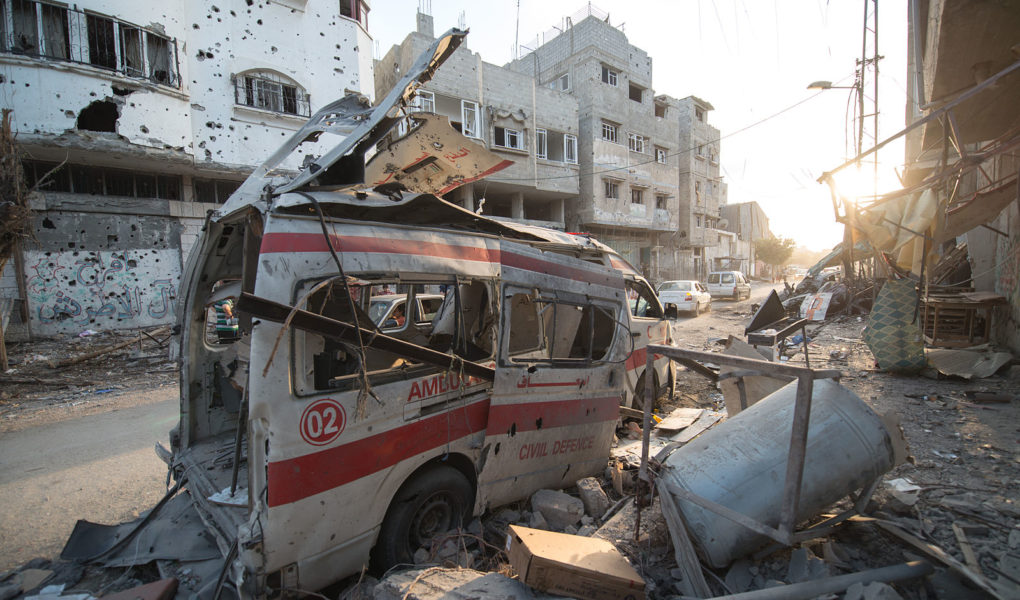Boris Niehaus (www.1just.de), CC BY-SA 4.0 <https://creativecommons.org/licenses/by-sa/4.0>, via Wikimedia Commons
There has been a recent push in the US to utilise the Palestinian Authority (PA) as a “go-between” to ensure that aid to Gaza reaches civilians and is not pocketed by Hamas, the terrorist group currently controlling the Palestinian territory. But what this push signifies – and what its long-term ambitions might be – deserves further examination.
The reliance on the PA to be the broker of stability in the Arab-Israeli conflict is ill-considered, because partnering with a group itself implicated in terrorist activities in order to stop terrorism represents a failure of logic. It is easy to forget that the US Congress, in the 1987 Anti-Terror Act, determined the Palestinian Liberation Organisation and its related entities to be sponsors of terrorism and a threat to US interests. The PA fits squarely within this law.
Although the conditions attached to the law were waived by every administration prior to Donald Trump’s, the law itself remains on the books. In fact, the law was augmented with the passage of the Taylor Force Act in 2018, which cuts US funding to the PA until it stops what has been described as a “pay for slay” programme. The programme issues stipends to the families of Palestinians killed or imprisoned for crimes committed against Israel, and has, in effect, subsidised terrorist activity. The latest round of violence between Israelis and Palestinians was further fuelled by the PA’s endorsement of a “day of rage” against Israel.
The illogic of moving towards peace by partnering with the PA for Gaza’s recovery underscores that Palestinian populations in both Gaza and the West Bank are in genuine need of a new organisation to promote Palestinian welfare – one that won’t be subject to the corrupt machinations of both Hamas and the PA.
The UN previously has accused Hamas of siphoning off humanitarian aid, and Hamas’s impressively ridiculous system of tariffs on imports, absorbed by the Gazan consumer, speaks to its willingness to exploit its own citizens. But corruption is not limited to Hamas.
The PA is guilty of such manoeuvres as well. It perpetually complains of having insufficient funds to serve the population. But that did not stop President Mahmoud Abbas from purchasing a home for $32 million and a private jet for $50m. As a candidate in the upcoming PA presidential election, Muhammad Aref Massad, who spent time in prison for terrorist activities, even wrote earlier this year: “The Palestinian leaders do not want freedom and do not want peace because they profit from the war and destruction in which we are engulfed… Any money that you send [to the Palestinian Authority] increases the power of the dictator, the terrorists and the robbers who starve my Palestinian people.”
Yet, despite the moral bankruptcy of the PA, a senior official at the US State Department earlier this week repeated that Washington would be “working in partnership with the UN and the PA to channel aid there in a manner that does its best to go to the people of Gaza”.
If foreign governments are serious about assisting the Palestinian people, the objective should be establishing an honest destination for such aid – one that does not rely on groups who have remained only tenuously off the State Department’s list of Foreign Terror Organisations.
A reasonable answer to the lack of such a destination would be to establish one. A new NGO – funded by Arab countries, the US and interested European powers – would help to create an alternative power base focused primarily on the welfare of Palestinian society.
While there are certainly hurdles to creating such an organisation, including determining its staff, its immediate efficacy in Gaza would be two-fold. It would provide a destination to ensure that aid to the Palestinians reaches the civilian population, and it would remove the danger of trusting a third-party conduit. Indeed, some Arab countries curtailed PA financial assistance in part due to its general incompetence. The groundbreaking Abraham Accords are yet another affirmation of that exasperation.
In the long term, establishing a new organisation of this nature has the potential to create an alternative power base for the Palestinian people. If the ultimate goal is to rid Gaza of terrorists, surely that goal is not reached by empowering an organisation with links to terrorism, albeit one that is opposed to Hamas.
Finally, setting up such a structure would allow the US to assist the Palestinian people without violating its own Taylor Force Act. Given that the PA spends roughly seven per cent of its budget on the “pay for slay” programme, removing the PA from the aid equation would ensure a cleaner transfer of funds. Indeed, anything less could result in laundering US taxpayer dollars for terrorism.
Those committed to helping Palestinians must realise that the current institutions tasked with doing so are corrupt, insufficient and self-interested. Tackling this perennial problem begins with removing the PA from the aid equation.
As chairman of the PLO since 2004 and president of the PA since 2005, Mr Abbas has done little to change the fact that both organisations are sponsors of terrorism. It is time to introduce new slogans for those currently demonstrating for peace in the Middle East: “Replace the PLO with an NGO” and “Replace the corrupt PA. End pay for slay”.
Mike Pompeo is a former US secretary of state. Sander Gerber is the chief executive of Hudson Bay Capital Management, a distinguished fellow at the Jewish Institute for National Security of America and a fellow at the Jerusalem Centre for Public Affairs.

